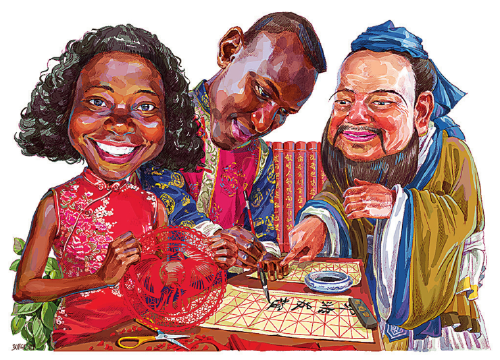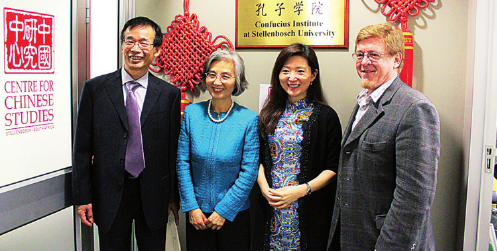BONDS OF WISDOM
点击量:89496
新闻类型:Culture
新闻来源:ChinaDaily
更新时间:2014-5-25 8:08:09
China's most celebrated sage has become the emblem of the country's soft-power drive and of its people-to-people diplomacy in Africa. Todd Balazovic reports.
Todd Balazovic
In Africa, it's Chinese businesspeople who sign multimillion-dollar deals, top politicians who sign major cooperation agreements and people who embody China's most famous thinker who act as cultural ambassadors. The Confucius Institute, China's government-sponsored language and culture program, is acting as a link for those looking to engage China outside the realm of business and politics as Africans across the continent take up Chinese-language studies.
The institute, which turns 10 years old this September, is run by the Chinese National Office for Teaching Chinese as a Foreign Language, also known as the Hanban. In less than a decade, its presence on the continent has gone from zero to more than 38 institutes and classrooms in 26 countries. Africa's first Confucius Institute was established in 2005 at the University of Nairobi, Kenya.
"Africa has become the place where the Confucius Institutes are growing most rapidly and enthusiastically," Xu Lin, director-general of the office of the Chinese Language Council International and chief executive of the Confucius Institute Headquarters in Beijing, said at a recent media event.
The institute's growth in Africa parallels the rapid growth in trade between China and the continent.
Last year, China-Africa trade reached $210.3 billion. During Premier Li Keqiang's recent four-nation trip to Africa, he urged both partners to boost bilateral trade to $400 billion by 2020. He identified six key areas of cooperation, and cultural exchanges seem to be the one in which both sides appear poised to make considerable progress.
As the number of infrastructure projects funded by China in Africa nears 300-all are "hard power" projects-the Confucius Institute is perhaps the flag-bearer for China's soft power and people-to-people exchanges on the continent.
"In practice, increasing (China's) soft power in Africa means strengthening the cultural exchanges so Chinese and Africans get to know one another better," says Lu Shaye, director-general of African affairs at the Ministry of Foreign Affairs.
"Africa plays an important role in China's diplomatic strategy. And, accordingly, increasing China's soft power in Africa is very important."
The Confucius Institute is often compared with organizations such as the United Kingdom's British Council, Germany's Goethe Institute, France's Alliance Francaise and Spain's Cervantes Institute, most of which have been around for many decades. But it's a relative newcomer to the globe's national culture associations club.
In its short life, the Confucius Institute has cast its net wide, opening more than 440 branches and 640 classrooms-a sister program aimed at secondary education-in 120 countries.
By 2011, China had spent more than $500 million on Confucius Institute programs. In six years, the program hopes to double the current 440 institutes worldwide, with a goal of reaching 1,000 by 2020.
France's Alliance Francaise, which was established in 1888, has 1,040 establishments in 136 countries, while the British Council, founded in 1934, has 200 offices in 100 countries.
Unlike most of its European counterparts, the strategy of the Confucius Institute appears to be more hands-on. It sets up offices on university campuses connecting African students to China and its academic institutions.
"It's absolutely different in terms of organization because the Confucius Institute is the only one of the 10 cultural and language institutions which is actually located in the heart of the university," says Kenneth King, author of China's Soft Power In Africa, and a professor of China-Africa relations at the University of Edinburgh.
Traditionally, the opening of a Confucius Institute is demand driven, with universities approaching the Hanban, which helps match them with a partner university.
"The partner university in China plays an absolutely critical role in facilitating the program," King says.
"The idea is that, through the Confucius Institutes, you'll get access to a partner university with whom you can do a whole series of things that are very attractive in the Confucius Institute's development terms. It's a very important dimension."
Similar cultural organizations generally set up independent offices geared more toward servicing an entire city rather than a specific university.
Robert Kotze, co-director of the Confucius Institute at Stellenbosch University in South Africa, says the unique model has helped Confucius Institutes to generate positive results and expand their reach in a short time.
"Universities usually provide a stable environment and an eager audience," he says.
As China's involvement on the continent becomes more prominent, Africans are eager to learn the Chinese language.
Earlier this year, South Africa's education minister approved a plan to introduce Chinese in the country's school curriculums, starting with 16 pilot schools.
"We hope to learn from the Chinese experience through exchanges of knowledge and human capital, which we believe will be extremely beneficial," Angie Motshekga, South Africa's minister for basic education, said in a speech at Shanghai's East China Normal University during her visit in February.
"There are currently six Confucius Institutes in South Africa. And with the help of the Chinese government, a curriculum for the teaching of Chinese will be developed and offered in schools around the country."
Director of the Confucius Institute at South Africa's Rhodes University Marius Vermaak says that, since the school opened the Confucius Institute in 2009, the number of students studying Chinese has kept pace with those studying more conventional languages.
Currently the program offers a three-year bachelor's degree and has an annual intake of 40 students.
Vermaak says the number is growing. Annual enrollments are expected to reach 100 in two years.
"We're bigger than Afrikaans. We're bigger than German," Vermaak says.
Prior to the Confucius Institute's opening, the small liberal arts college with 8,000 students offered no Chinese-language programs. It was the intention of bringing a new language to the school that swayed Vermaak to explore the Confucius Institute option when the Chinese embassy approached him in 2008.
"I thought it was blindingly obvious that China will be a major factor in our students' lives for the bigger part of the 21st century," he says.
Rhodes University partnered with China's Jinan University, which was responsible for helping develop the program's curriculum and providing the teaching staff, to offer a Chinese-language degree within a year.
"Right from the start, we offered a serious academic program. This was not going to be a club somewhere on the margins of the university. Right away, it was established as a school of language and part of the school of humanities," Vermaak says.
Their efforts have paid off. Last year, Rhodes University was declared a model Confucius Institute along with the program at the University of Nairobi in Kenya. By 2015, it hopes to expand its program to include a master's degree in Chinese.
Other plans include the development of a Chinese Studies Center for research on Sino-African ties, Vermaak says.
Vermaak attributes much of the success to the Hanban's continued support, even four years after the center was opened.
As outlined by the enthusiastic expansion plans for Rhodes, the benefits for a university receiving funding from the Hanban are vast.
According to reports, host universities can receive between 315,000 yuan ($50,000) and $100,000 as initial funds to help establish the center, and also an annual upkeep fund based on program size.
But the benefits go both ways, Vermaak says.
"You should not think of Confucius Institutes as one-way conduits. They act as important meeting places and the benefits go both ways," he says.
"Chinese are working hard to internationalize and to gain as much experience as possible from other parts of the world. We are playing an important role in helping them do that."
Following their partnership with Rhodes University, the Guangzhou-based school established an Institute for African Studies, largely because of the support Rhodes provided.
Rhodes has also provided guest professors to China, who teach in Shandong's provincial capital Jinan, Vermaak says.
While many schools look to the Confucius Institute as a way to establish language programs, it is the great potential for academic exchange that benefits those with Chinese-language instruction already in place.
This was what prompted Stellenbosch University to integrate its Confucius Institute into the school's postgraduate and international office in 2009.
Home to the Center for Chinese Studies, one of the longest-standing China-Africa research centers, Kotze says the Confucius Institute equipped the school to forge a platform for deeper academic ties with Chinese universities.
"It creates an environment at the university where we can develop our relationships and develop a better understanding of China," he says.
" (Confucius Institutes) assist in bringing in delegations, assist in advising on what level of engagement we should have with a specific university and help build our university's bilateral relations with Chinese institutions."
Since it was set up at Stellenbosch University, the Confucius Institute has helped the school build formal partnerships with almost a half dozen Chinese schools, beginning with Xiamen University.
By hosting a Confucius Institute, Kotze says it also helps attract Chinese students studying overseas by lending credibility to the higher education system in that region.
"The institute has helped us in creating the perception that higher education in South Africa is fine, and that it's OK for students to explore it as an option," he says.
Beyond academia, Confucius Institutes also play a big role in the surrounding communities.
Through resources Confucius Institutes provide, Stellenbosch has established a community outreach program to serve secondary schools in the surrounding areas. It sends teachers to 14 local schools for weekly language and culture lessons.
Similar programs are in place across the continent, where Confucius Institutes act as pillars of the Chinese community, spreading knowledge and understanding of the language as China becomes increasingly intertwined with Africa.
Earlier this month, six divisions of Cape Town's police force that operate in areas with a strong Chinese presence began free language classes at the University of Cape Town's Confucius Institute to help them respond to cases involving Chinese nationals.
The Confucius Institute at the University of Khartoum in Sudan is responsible for organizing more than 30 cultural events every year, each attracting hundreds of locals.
"Lots of people attend these events," says 26-year-old Ma Pengcheng, a volunteer teacher working at the Confucius Institute in the University of Khartoum.
The biggest annual event, Ma says, is the Spring Festival gala in which visiting Chinese art troupes perform, attracting more than 1,500 residents.
Ma, who has worked as a volunteer teacher in Sudan for more than two years, says showcasing China's culture is one of the biggest tasks his job entails. "My main job here is as a Chinese teacher. But I also have to be a cultural messenger," he says.
Ma, who was assigned to the post from Northwestern Normal University in Northwest China's Gansu province, says one requirement of working at a Confucius Institute is basic knowledge of traditional arts.
As volunteer positions to teach overseas become more sought after by Chinese students looking to bolster their resumes while gaining international experience, the recruitment standards set forth by the Hanban are increasingly strict.
"It's my dream job," Ma says.
"Before, not many people would want to come. But now the benefits provided by the institute are getting better. As more people want to go to a Confucius Institute, the requirements and entrance examination are becoming more and more difficult."
Basic qualifications in language instruction used to be the only requirement. But now, skills relating to Chinese culture such as tai chi or calligraphy-Ma is skilled in both-are necessary.
Expecting to sign up for a third year, Ma says it is not only a chance for him to teach Chinese but also bring knowledge from Africa to Gansu when he returns.
He says the experience he has gained will help foster better understanding between China and Africa.
Contact the writer at toddbalazovic@chinadaily.com.cn

 Robert Kotze, co-director of the Confucius Institute at Stellenbosch University in South Africa, says universities provide a stable environment and an eager audience. |
分享:
责任编辑:冰纪(超级管理员) 
|


![]()